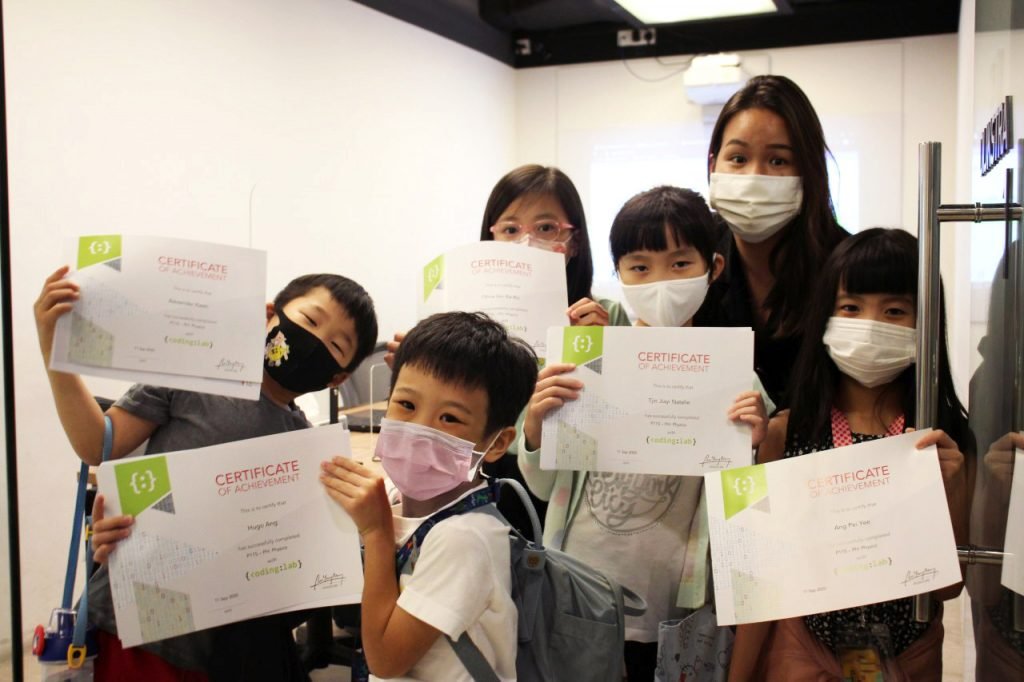Did You Know? Advanced Computer Scientists (ACS) series
Our previous Did You Know? from our Young Computer Scientists (YCS) series let many of you wow your friends with your knowledge. We heard you! We have decided to bring back more fun facts – this time from our Advanced Computer Scientists series.
Our ACS student having fun in class!
In the P21S Advanced Computer Scientists (ACS) course, our 10-to-12-year-olds can collect 12 different badges. Each badge allows them to delve into diverse fields of application for coding, from UI/UX design experience to Game Development and Math, just to name a few.
Turtle Race by Emily, 12, Advanced Computer Scientists
Turtle Race by Emily, 12 years old
Space Invaders by Luciano, 12, Advanced Computer Scientists
Space Invaders by Luciano, 12 years old
The ACS programme spans three main types of learning – Hardware-Based, Syntax-Based and App Development. Upon completion, our students would have had hands-on experience with bots and be well-versed in writing real-world apps and programs that they can use to help others.
Our curious Advanced Computer Scientists trying out in-class activities
Without further ado, check out these 3 ‘Did You Know’ facts that we share with our ACS students in our award-winning curriculum – and make sure to pass on the knowledge to others! 😉
1. Role Playing Games
What defines a Role Playing Game (RPG)? It is a game where a player takes on the role of a fictional character in a fictional world – fantasy being the common thread. Most RPGs have character growth and advancement, coupled with an entrancing plot that immerses players into the lore and the world of the game [1]. A good RPG is balanced, will keep gamers hooked for hours, and leave a lasting impression.
For the more mature gamers out there (like your parents, teachers, and maybe even yourself), big names like Final Fantasy, The Legend of Zelda, World of Warcraft, and more old school games come to mind when they think of RPGs. Now, we have more recent or remastered titles such as the new Doom, Divinity Original Sin 2, Monster Hunter: World and The Witcher 3.
Snapshot of Online HBL class
Snapshot of Online Home-Based Learning class for ACS
In Python Choose Your Own Adventure, our ACS students learn about RPGs. They get to code their character creation, equipment upgrades and boss fights. Classes also touch on game design topics, like balancing their games. This refers to tweaking a game to be interesting, deep, and fair [2]. Game balance affects battles and a person's progression in a game.
Imagine being stuck on the tutorial and unable to level up? What about reaching the maximum level in 2 hours and there is nothing else for you to do? RPGs with the level and experience system usually make starting levels easier to level up and almost impossible at higher levels. Without balance, people will quickly get bored of the game.
2. Global Positioning System
When modelling an app after Healthy 365, our ACS students learn about UI/UX design and tap on the many different sensors found in our phones. Do you know how our phones are able to find our location or track our number of steps?
We've all heard of GPS. The Global Positioning System (GPS) used to be a satellite-based radio navigation system owned by the United States government [3]. When the project was initiated, the 24-satellite system became fully functional in 1993 and was used to perform trilateration to pinpoint your exact location on Earth. Trilateration measures distance. Your position would be determined by the intersection of multiple intersections of GPS signals [4].
When it comes to tracking our steps, Abraham Louis Perrelet is the brilliant mind behind the pedometer [5]. Through the years, multiple improvements have been made to the pedometer. From the ancient versions using mechanical switches to the current day's implementation with Micro-Electro-Mechanical Systems (MEMS) sensors and sophisticated software.
3. Quiz Gameshow
Come on down, it's time for the quiz gameshow! Our ACS students get to code their own quizzes and learn more about programming, such as extensibility and the incremental build model. We also include fun facts, like this one... Legend has it that "quiz" is actually a very recent word created in the late 1700s. The story behind the word is a bizarre one and here is how it goes.
A wager was made in 1791 by Richard Daly in Dublin. He wagered that within 48 hours he could make a nonsense word be spoken throughout Dublin, one with no meaning and not derived from any language. He sent his employees to go around Dublin chalking the word "Quiz" everywhere and soon this word became the talk of the town which meant that Daly won the bet and this caused the word to become commonly used.
Of course, this story is not 100% factual and there are many sources that dispute the truth of this story [6]. So for now, let’s just say this is a folktale – and an interesting one too.
Our ACS student exploring the course
Now that you’re armed with all of this cool information, spread the joy of learning by sharing this with your friends and family!
(Written by Cheryl Tang)
Join the Coding Lab family! Click here to sign up for our monthly newsletters.











